 |
||||||||||||||||||||||
|
||||||||||||||||||||||
 |
| To give readers an idea of what goes into a CD, could you tell us about the series of events relating to preparing and recording the Goldberg Variations, the most recent of your recordings. | |
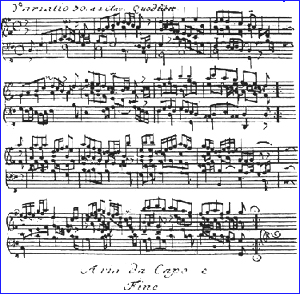 The
Goldberg Variations is a once in a lifetime project. A musician probably
cannot do a bigger or more demanding project. It was on my mind for years.
One day this piece sort of just knocked at my door and I just had to open
it. The
Goldberg Variations is a once in a lifetime project. A musician probably
cannot do a bigger or more demanding project. It was on my mind for years.
One day this piece sort of just knocked at my door and I just had to open
it. The problem was to find the time to do it. It takes a lot of time to study it. I was in Italy about one and a half - almost two years ago and while at the hotel, I started to practice it. As I practiced it, I realized that I was somehow able to play it. The recording was made the next year in August. 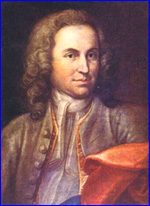 What
can I say... it is a huge project, and maybe one can never be satisfied
with it, it is just so big for us. Can you imagine that Bach was actually
able to compose it and to play it! That is something! Its enough of a
project to just play it! What
can I say... it is a huge project, and maybe one can never be satisfied
with it, it is just so big for us. Can you imagine that Bach was actually
able to compose it and to play it! That is something! Its enough of a
project to just play it!I recorded it in four evenings. It was the longest recording session until today. Normally I have done my CD's in a couple of evenings, but this was so big, almost 76 minutes in duration (with all the repeats) that I recorded the first half in two evenings, and then the second half also in two evenings. It was for me, the minimum time to do this. I couldn't do it faster and still achieve this result, with which I'm almost satisfied. Now I would already play it differently, but as with every CD, it is already old the day after its made.  It
has received some very favorable reviews. In June 2004 the Goldberg Variations
CD was chosen as "CD of the Month" by the Finnish Classical
Music Magazine "Rondo Classica". To the general music society,
the idea of Goldberg Variations on accordion might sound a little strange,
or even very weird, but somehow the reviews so far have all been very
positive. It
has received some very favorable reviews. In June 2004 the Goldberg Variations
CD was chosen as "CD of the Month" by the Finnish Classical
Music Magazine "Rondo Classica". To the general music society,
the idea of Goldberg Variations on accordion might sound a little strange,
or even very weird, but somehow the reviews so far have all been very
positive. |
|
| You have done so much with the accordion, but do you have any memorable highlights such as TV appearances or Premiere Performances etc.. that you would like to share with us? | |
| I don't really
like to think that way.. I'm not really interested in highlights, Diplomas
and such. It is all about myself inside. Performing is my private work
and I'm looking for something on the inside. I suffer before every concert and I sometimes I swear I will never do it again and these days it gets even worse! When I was younger, I was much more egotistic about these type of things when there were nice celebrations and accolades after a successful concert or premiere, but now that has all gone. If I look into the mirror both before a concert and after a concert, it is the same person. I know better than anyone how human or non perfect I am, so I cannot be totally satisfied with what this 'non perfect' person is doing or has done. As I always say, I think slowly and I am always looking towards the future. I want to check my situation when I am 40. I want to ask myself if I learnt what I promised myself I would do, and then decide what I will be going to do in the following years. If I cannot do it today I will work on it in the future... again, just slowly.. but this process produces the long lasting results. So, no highlights really. |
|
| Is there any teacher or artist to whom you would like to pay particular tribute, for their inspirational effect on your musical career? | |
|
To be honest.. not really. |
|
| You were the winner of the 1989 Coupe Mondiale in addition to other international competitions. What are your thoughts regarding competitions and their importance to the up and coming artists? | |
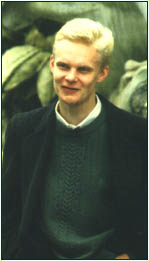 I'm
not really for competitions. I don't really understand what the competitions
can produce, that one couldn't achieve without them. I'm
not really for competitions. I don't really understand what the competitions
can produce, that one couldn't achieve without them. Perhaps for the motivation of the student it is a useful tool to prepare a big program to study the psychology of this demanding process, to see how the psyche will function. Competitions might prove to be a tool to do this if there are not other possibilities. Also, to be honest I've seen juries in action and it is very difficult for them to work objectively. The accordion world is very small and everyone knows each other. Many things could and have happened. So far the so called 'fair play' has never really existed in any music competition even in the great great piano or violin competitions. This 'fair play' just doesn't exist. Its very wild time for the candidates as well. After I received prizes in the various international competitions, I didn't get any bookings because of it. After winning the Coupe Mondiale I did get the possibility to make my first CD which was like the jackpot, but since that time, nothing. The world is full of competition winners. Any artist performing on any instrument in any festival has won this and that competition, but what good has it done? It seems like we have a competition winner on every block. I don't know, I'm not totally opposed to competitions, but on the other hand, I'm not really for them. It has been talked about making a competition offering concert tours and launching a career, but in a way it is just a dream, the real life is the real life and that is the way it has been for a long time, and so far nothing really comes of a competition. So unfortunately the situation seems to be that each person has to find their own way. We can look at the late Mogens Ellegaard. He was not known as a great competition winner, but became a legendary figure in the accordion and music society because of his outstanding work in other areas. Some of the other leading figures of the accordion world have never participated in accordion competitions either, but they are still very well known and respected in the areas of avant-garde music, chamber music, composition and so on. So there are many possibilities, but of course it is difficult. Perhaps someone does receive something for a competition, if there happens to be the right person in the he audience, but until now, I have never seen a music agent at an accordion competition. I don't know if anyone has ever invited them there in any nation, but in all other instrumental competitions there are agents listening and checking out if there is anything or anyone interesting, but we are a bit primitive in this sense I guess. |
|
| Your repertoire is extremely vast, including many transcriptions which are featured on your recent CD of the same title as well as on previous CD's. Tell us about your process of selecting and working transcriptions into their finished product. | |
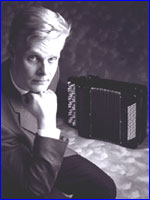 Its
a very selfish process I think... its question of what one likes and what
one wants to play, then you have to find a way to do it. To me music is
a practical thing. It has always been a practical thing. Its
a very selfish process I think... its question of what one likes and what
one wants to play, then you have to find a way to do it. To me music is
a practical thing. It has always been a practical thing. During the last 50 years, there has been some kind of direction among some reviewers, musicologists and such who are looking for some ideals. They are thinking of a very pure sound with old instruments and so on, but in reality the history of music is practical. Bach was a transcriber, and then it went on until it ended up that Horowitz was maybe the last big transcriber, but now its coming back again. Transcriptions can be made badly or they can be made well, that is the issue. Mostly I select to do transcriptions of transcriptions. I often find pieces that have already been transcribed once. The Vivaldi concertos have been transcribed by Bach, the Chaconne by Bach has been transcribed by Busoni and the Vocalise by Rachmaninoff has been transcribed dozens of times. I was thinking at a certain point that it was fine to follow those ideas of transcriptions and then make my own transcriptions with the same spirit. I would even add things sometimes, so it ended up somewhere between an arrangement and a transcription. It is very important to understand what sounds good and what doesn't. For example in the case of the Bach Chaconne, I played it for 20 years before I finally recorded it. During these 20 years, I have changed my transcription several times. Now I'm planning to put it back into my program, but not as the same transcription! I have some ideas to change it again! Music is practical and ... slow. Its always the practical old traditional hard working culture of learning by doing. Very simple! |
|
| You have been instrumental in the recruitment of several new works for the accordion. Tell us about the importance of working with these composers in commissioning new works. | |
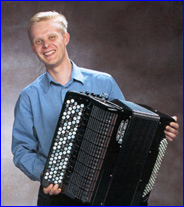 That
is a duty! Even though I am thinking of myself, my own repertoire and
career, I realize that each one of us must do our duty for the next generation
of accordionists. If during one accordionist's lifetime one can commission
lets say 25 pieces, then in the big international picture it produces
a huge amount of repertoire in different styles, and that is very important. That
is a duty! Even though I am thinking of myself, my own repertoire and
career, I realize that each one of us must do our duty for the next generation
of accordionists. If during one accordionist's lifetime one can commission
lets say 25 pieces, then in the big international picture it produces
a huge amount of repertoire in different styles, and that is very important.I'm just trying to do what everyone should do. Secondarily, to be associated with people that are smarter than I am - the best composers, is a way to study... it is a way to learn. Its a very important thing. From one composer for example, you might learn very complicated rhythmical things because that composer may specialize in it. Or there is a composer like Kaipainen who was very interested in removing the technical barriers. He wanted to do something so extraordinary difficult, that t was like a project to study it and learn it. After that piece I felt I had developed myself a little more technically. So its a duty and also an educational question. Of course it also brings the accordion to a positive light when famous composers write for it. Listeners in the musical society and others realize that these famous composers don't just write for anyone, so there must be something in this instrument. It ends up raising the respect of our instrument as well. These are the important things. |
|
| For an artist of your stature, your instrument is of utmost importance. You are the owner of a rather new Jupiter Bayan from the Jupiter factory in Moscow. Can you tell us a little bit about this beautiful instrument and the craftsman involved. | |
 |
|
| I have been
very lucky with my instruments. During my adult life I have had three
very fine instruments. This is the latest of the three and probably one of the best bayan instruments that has ever been produced in the history of the modern accordion world. This bayan is made for me. It is not an ordinary instrument. All the things such as the intonation, the dynamic capability and such things are designed for the way I play. The makers are the best of the best. It is a team effort. My previous instrument which was from Italy was also very fine I have to say. However, I'm always looking for something a bit better I don't really care what brand it is. If I find an instrument with features which are closer to what I am looking for, I wouldn't hesitate to change it. I move also quite slowly in that area too. I don't want to necessarily be tied to an instrument for ever. If there will be development in manufacturing over the next 20 years that will produce something better than this instrument. So then I'll change to that. |
|
| You have performed the works of Astor Piazzolla many times with various orchestras and ensembles. This month, you made your premiere performing Piazzolla on Bandoneon. Tell about your transition to include Bandoneon? | |
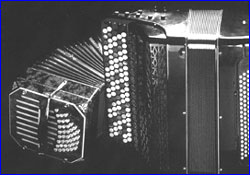 It
was a long process. For me to finally own one and actually play on bandoneon
was the result of 10 years. It
was a long process. For me to finally own one and actually play on bandoneon
was the result of 10 years. Initially I was a bit against it, because in some ways I have always thought that the accordion can produce the same, or even a better sound. But I was also quite curious. There was also the question of the audience and the organizers. Sometimes people told me that if you play Piazzolla on accordion it is not very acceptable, so I decided to play on Bandoneon and then see what they can find to say. Since I got this very fine bandoneon, it has almost taken one year before performing on it. I play a chromatic instrument so it is a bit easier but still the whole ergonomics is different, so I needed some time to adapt. The instrument is made by Victoria. Its a fascinating modern Bandoneon with an incredible dynamic range. Its quite unique having such a broad range from incredible pianissimos to dynamic fortissimos almost as big as my bayan. Its the concept of how they use the wood that allows such an incredible sound. |
|
| At festivals abroad and here in Finland, including this one here in Ikaalinen, you give lectures on various subjects. What are your favorite topics to lecture on? | |
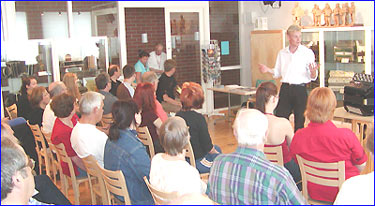 I
always like to speak about technical aspects of playing. The accordion
is so young still, that we cannot compare our methods and understanding
of the dynamics of the body with the piano and violin, where the techniques
have been tested for hundreds of years. With those instruments, there
is a lot of tradition and to each question there is an answer as to why
its done that way. I
always like to speak about technical aspects of playing. The accordion
is so young still, that we cannot compare our methods and understanding
of the dynamics of the body with the piano and violin, where the techniques
have been tested for hundreds of years. With those instruments, there
is a lot of tradition and to each question there is an answer as to why
its done that way.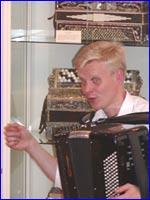 With
the accordion its not quite the same. Because of the amount of playing
I have done, I think I have some knowledge that cannot be read from books.
It's the knowledge of the 'how and why' about certain concepts of playing. With
the accordion its not quite the same. Because of the amount of playing
I have done, I think I have some knowledge that cannot be read from books.
It's the knowledge of the 'how and why' about certain concepts of playing.I do teach these things a lot. I try to at least open some eyes to the idea that the fingers don't play the accordion. The finger is the most unimportant thing. It's the last touch with the accordion. All the techniques are created before going out from the fingers. Bad fingers doesn't exist, but bad joints, bad elbows, bad shoulders, bad stomach, bad legs and bad backs do exist! It has been my own experience with my students that it's possible to learn much by researching such things. 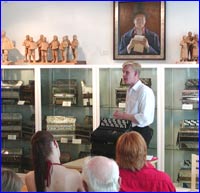 I
have spent a lot of time researching how pianists really play in the different
schools and the key point is that the playing always comes from the body
not the fingers. There is much to learn and a long way to go before we
have reached the level of virtuoso. Virtuoso means 'limitless possibilities'..
limitless! Somebody once said 'to know what is above virtuosity, first
one must master virtuosity.' So, that is what we have to do right now
and then let's see. I
have spent a lot of time researching how pianists really play in the different
schools and the key point is that the playing always comes from the body
not the fingers. There is much to learn and a long way to go before we
have reached the level of virtuoso. Virtuoso means 'limitless possibilities'..
limitless! Somebody once said 'to know what is above virtuosity, first
one must master virtuosity.' So, that is what we have to do right now
and then let's see. |
|
| Tell us about your family and do they share your interest in music and the accordion? | |
| My wife has a musical education. My oldest son is now 8 years old and he is just starting his 4th year of violin study while my second son who is just 5 years old has just been accepted to the Institute to study violin. In addition, my oldest son is playing in the student orchestra. My daughter is just one and a half years old, so let's see... | |
| What non-accordion music do you most like to listen to? | |
| The old cliché
goes that "I only listen to good music." But I don't know what
good hip-hop or punk music is, or how to measure what is good punk. I change my interest all the time. A couple of months ago, I was fortunate enough to be in one of the greatest concerts I have ever heard by the Russian pianist Grigory Sokolov. Since then, I started to listen to lots of Scriabin. Until this time, I hadn't listened to a lot of that. It depends a bit. I concentrate on one subject at a time . I can have a period of Bach or I can have a period of Rachmaninoff where I listen to just that music and nothing else. Probably it has something to do with my own way of working because I also concentrate on playing one thing only. I don't spread my energy to several things. I find focusing on one thing at a time is the fastest way to learn, and I also like to learn by listening. |
|
| What other interests and hobbies besides music do you have? | |
| These days not
many. There was a time when I was very active in sports, but now I can basically only do two things, music and my family. Music is my hobby and my profession at the same time, so it takes 24 hours a day. I live that way. I seem to practice even when I sleep, always trying to solve problems. Then, I have three little children, so they are my private life. Other than that, my social time is quite minimal. |
|
| What do you regard as your greatest achievement? | |
| It hasn't come
yet. I cant really name my goal. Of course it would be nice to have this and that, but in the days when I was a child I couldn't imagine how life could change. I already achieved more than I was expecting in general. In addition, the development of our instrument has got much more to go if we want to see it progress, and people always want more and more now. They don't realize that life is here and now and that the situation of our instrument is already much better than it was years back, so its important to be comfortable with our instrument. I'm not ashamed of playing the instrument like maybe 20 years ago. Now I can say it quite proudly and quite professionally that I am an accordionist. So, maybe my achievement is being a musician among musicians but I don't think it is so unique, and I hope other people have the same experience as well. |
|
| What musical advice do you have for aspiring accordionists? | |
| They must go
at a comfortable speed and pace. It is much more important to become a
great musician that to get a great career for two years. Really, I have
seen so many people who want everything right now, but everything needs
time and they just have to try and realize that. Working... practice.. slowness... patience.. these are the things I would suggest. I should add that I didn't have any of those qualities myself in the early days, but I learned their importance relatively soon. I guess I was like anyone was in their early 20's, but I learned quickly enough luckily. |
|
| What goals or plans do you have for the future? | |
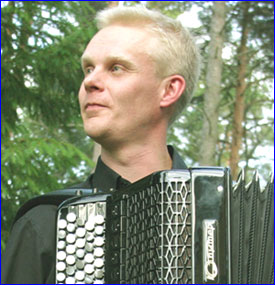 My
concert tomorrow! (in this case, the performance of the complete Goldberg
Variations). My
concert tomorrow! (in this case, the performance of the complete Goldberg
Variations).Some interesting things always come up. Sometimes other things get pushed aside. I'm working on some new programs and now I try to play a program for one year before performing the concert. There will be some premieres, like an upcoming premiere of a concerto with the Finnish Radio Symphony Orchestra, my recordings will come about one per year and the next two will include a chamber music CD and then a Concerto CD. For the next solo CD I'm not really sure yet. I have several programs that I could do, so I have some ideas. After the Goldberg Variations CD it's difficult to say. Normally people play the Goldberg Variations towards the end of their careers, but I played it early and now I have to go on! But these things are nothing so extremely special.. this is normal work for me... just my normal work of practice and going .... SLOW! |
|
|
|
|

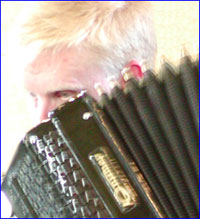 I
learned mostly through listening and reading which were two of my main
interests. I also became interested in other instruments very early.
I played Organ as my second instrument which was incredibly productive
to me. It was beneficial to study organ music, esthetics and cultural
things from different periods.
I
learned mostly through listening and reading which were two of my main
interests. I also became interested in other instruments very early.
I played Organ as my second instrument which was incredibly productive
to me. It was beneficial to study organ music, esthetics and cultural
things from different periods.